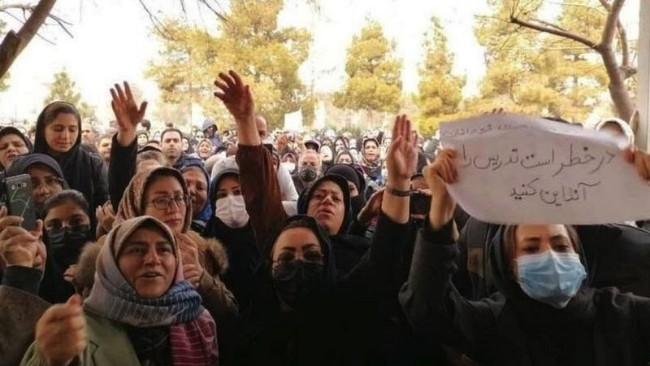International
Protests rock Iran over poisoning of school girls

Four schools in the city of Borujerd, in the western province of Lorestan, Iran, are said to have poisoned at least 194 girls, in the past week.
At the Khayyam Girls’ School in Pardis, close to the Iranian capital of Tehran, another 37 girls were poisoned on Tuesday.
Before becoming unwell, the poisoned girls claimed to have smelled rotten fish or a tangerine.
This triggered a public protest of at least 100 individuals earlier this month outside the Qom governor’s office.
“You are obliged to ensure my children’s safety! I have two daughters,” one father shouted in a video widely shared on social media. “Two daughters… and all I can do is not let them go to school.”
“This is a war!” declared a woman. “They are doing this in a girls’ high school in Qom to force us to sit at home. They want girls to stay at home.”
Some parents have said their children were ill for weeks after the poisoning.
Read also:Iran executes British-Iranian, Akbari, for allegedly spying
Another video from a hospital shows a teenage girl lying dazed on a bed, with her mother beside her.
“Dear mothers, I’m a mother and my child is in a hospital bed and her limbs are weak,” says the distraught mother. “I pinch her but she doesn’t feel anything. Please don’t send your children to school.”
Almost 700 girls have been poisoned by toxic gas in Iran since November, in what many believe is a deliberate attempt to force their schools to shut.
No girls have died, but dozens have suffered respiratory problems, nausea, dizziness and fatigue.
“It became evident that some people wanted all schools, especially girls’ schools, to be closed down,” the deputy health minister said on Sunday.
The prosecutor general announced last week that he was opening a criminal investigation. However, he said that the available information only indicated “the possibility of criminal and premeditated acts”.
At a news conference on Sunday, Deputy Health Minister Younes Panahi said the girls had been poisoned by chemicals that “are not military grade and are publicly available”.
“The pupils do not need any invasive treatment and it’s necessary to maintain calm,” he added.
Dr Panahi’s comment that it was “evident that some people wanted all schools… to be closed down” appeared to confirm the government believed the poisonings were premeditated.
His subsequent denial suggested splits among officials over how to handle public anger when no suspects have been identified.
The poisonings have notably been concentrated in Qom, a city that is home to important Shia Muslim shrines and the religious leadership that forms the backbone of the Islamic Republic.
Join the conversation
Support Ripples Nigeria, hold up solutions journalism
Balanced, fearless journalism driven by data comes at huge financial costs.
As a media platform, we hold leadership accountable and will not trade the right to press freedom and free speech for a piece of cake.
If you like what we do, and are ready to uphold solutions journalism, kindly donate to the Ripples Nigeria cause.
Your support would help to ensure that citizens and institutions continue to have free access to credible and reliable information for societal development.












